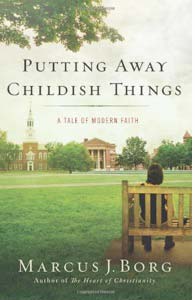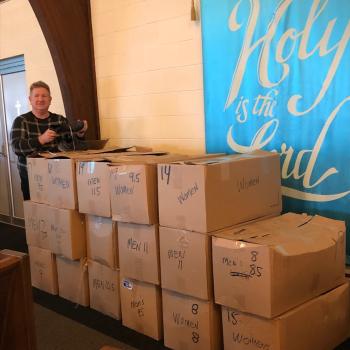By Martha K. Baker
 Putting Away Childish Things: A Tale of Modern Faith
Putting Away Childish Things: A Tale of Modern Faith
By Marcus J. Borg
HarperOne, $25.99, 342 pp.
Putting Away Childish Things: A Tale of Modern Faithis didactic. Usually labeling any book "didactic" is the kiss of retail death, but Marcus Borg's most recent book also courts a second smacker: it's a novel, a teaching novel.
Borg, a professor emeritus at Oregon State University, has written best-sellers -- Meeting Jesus Again for the First Time, Jesus, and The Last Week; these works of non-fiction cover religion, Jesus, the Bible, God, and Christianity, and so does this latest book. But for his first novel, Borg exploits fiction as a fact-delivery-system. The result, rather than being dry as kibble, is downright creamy. Maybe it's because the main character is one Borg is familiar with, and maybe it's because the character's field of expertise is Borg's, or maybe it's because he eases academic information beautifully into what he calls "a didactic novel."
Borg sets Putting Away Childish Things at Wells College, a liberal arts school, in Willow Falls, Wisconsin, staffed by conservative, tenured professors and administrators. Prof. Kate Riley is liberal, a Christian, a happy, 30-something spinster, and a very popular professor of religious studies. She smokes (only six a day), she drinks Guinness (two, tops, per sitting), and she likes red shoes (no limit). She loves her job, she likes Wisconsin -- even the mid-December days when the story opens -- and, after five years of teaching, she looks forward to settling down for good as a tenured prof. But soon after winter semester starts, she receives a proposal to apply for a one-year teaching post at a seminary.
Will she jeopardize her run-up to tenure at Wells by taking a year off? Why does she want to teach in a seminary? Why are her colleagues behaving like "gossip girls"? Why are her pupils' parents outraged at her? And what does she do about the fact that she once had an affair with the star of the seminary faculty?
Kate's questions swirl around her quotidian duties as a professor. Borg takes advantage of Kate's syllabus for Religion and the Enlightenment to teach readers what she teaches her students, for example, about the historical Jesus, the Bible, and meanings of "faith" and "believe." The reader audits Prof. Riley's class and, thereby, drinks from Marcus Borg's font of knowledge about the Enlightenment, theology, and religion.
Sitting in the class (alongside readers) are students, some of whom love Kate, and a couple of born-agains, including Erin, who is teased by questions she is afraid to ask her Bible study group. Of course, this doubting student is a device; so is Martin, the former lover. So is the classroom setting -- Dr. Riley probably borrows Dr. Borg's handouts and maybe his pedagogy, too.
But Borg molds Kate into a real enough character that, even when the story seems sluggish near the end, Borg makes it worth reading in the long run. He makes Kate's world real, too, and not just by dropping in references to NPR and the BCP. He concentrates on his message as he writes, not fussing with rhetoric in his style, that is, with beauty marks like metaphor or rhythm. He writes plainly, warmly, and with truth (except for the almost total lack of "like"s and "you know"s in students' discourse). Borg, an Episcopalian, unabashedly confirms Martin and Kate into his denomination, even has them explain why they chose it; he sends them to church and hears their prayers and attends the priest's sermons (for Episcopalians, these passages sing paeans; for others, they're product placement).
Although Putting Away Childish Things presents sermons, poems, lectures, and pastoral counseling, it all goes down smoothly. It's didactic, but it's also novel.
This article originally appeared at The Beatitudes Society blog and is reprinted with permission.
6/3/2010 4:00:00 AM




